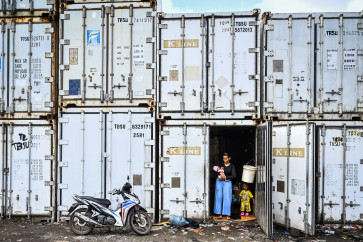Popular Reads
Top Results
Can't find what you're looking for?
View all search resultsPopular Reads
Top Results
Can't find what you're looking for?
View all search resultsLombok takes culinary route to develop tourism
Finger food: Lombok-style grilled chicken, ayam taliwang, is served as canapés
Change text size
Gift Premium Articles
to Anyone
Finger food: Lombok-style grilled chicken, ayam taliwang, is served as canapés.
Currently known mainly as an alternative to Bali, the neighboring island of Lombok in West Nusa Tenggara (NTB) is gaining increasing prominence as a tourist destination in its own right, and food may have something to do with that.
Besides its attractive beaches and surfing spots, Lombok, the name of which translates to chili, is also known nationwide as the home of the most delicious terasi (fermented shrimp paste) and hot spicy dishes — local food that will lead the culinary diplomacy to develop the region as one of the top tourist destinations of Indonesia.
A dinner event held by Javara Indigenous Indonesia in Kemang, South Jakarta, on Nov. 22 showcased delicacies and dishes from Lombok’s Sasak ethnic group with an upgraded presentation to appeal to both the palate and the eye of international and domestic tourists.
The ayam taliwang (a dish of grilled marinated chicken) for example, was shredded and served as canapés, while the normally spicy pelecing kangkung (boiled water spinach with chili shrimp paste sauce) got a more attractive look and milder tang at the event themed “Feast on Lombok Fusion Food”.
Other dishes featured at the event, such as beberuk terong (eggplant salad) and sate rembiga (Lombok’s take on beef satay), also received mouthwatering treatment from Sekolah Seniman Pangan (School of Food Artisans), a Javara subsidiary.
But the highlight was the newly created shiratake urab, a salad dish with noodles made of seaweed as its main ingredient that, if treated right, could be the pioneer of a food industry unique to the region besides its seaweed taffy and jelly home industry.
The dinner was prepared by 15 people from the farming and fishing communities of six villages in or near tourism spots of Lombok, who have just started a short course at the School of Food Artisans under the supervision of food techie and chef Bisma Surya Thama.
Complete meal: A plate of ayam taliwang canapés, blanched water spinach with spicy sauce, called pelecing kangkung, and beberuk terong, a fresh eggplant salad, is served during the buffet-style Lombok Fusion Food Feast event in Jakarta.The showcase of their new skills marked the start of a collaborative effort between the Indonesian government and Germany to establish sustainable and inclusive economic growth in Lombok.
A memorandum of understanding was signed earlier in the day between the National Development Planning Ministry and Deutsche Gesellschaft für Internationale Zusammenarbeit (GIZ) GmbH to promote job creation in the region using the concept of inclusive business with a focus on local wisdom-based entrepreneurship.
Other stakeholders in the joint effort are the Cooperatives and Small and Medium Enterprises Ministry, the Villages, Disadvantaged Regions and Transmigration Ministry and Bank BRI Syariah.
“The Indonesian government plans to see an economic transformation from the reliance on natural resources toward competitive manufacturing and modern services. In this project, our goal is to build entrepreneurship in tourism led by locals,” National Development Planning Agency (Bappenas) director for industry, tourism and the creative economy Leonardo AA Teguh Sambodo told The Jakarta Post at the event.
“The challenge is that the local residents don’t have the required skillsets and there is no product fit for the purpose. Therefore, this project encourages locals, [including] farmers and fishers, to take part in tourist activities.”
The first batch 15 students in the project came to Jakarta for the training course by bringing local ingredients and turning them into creative food products. At the end of the course, they were expected to come up with a selling product and to receive a loan to open their own businesses back home.
“The success of the project is the buy-in of the government, in which the ministries involved come together and designed the programs from the start. With this we would like to introduce a new mold for collaborative efforts and expect more ministries to join us,” said Teguh, adding that the Tourism and Creative Economy Ministry would join pending its merger with the Creative Economy Agency (Bekraf).
Javara and School of Food Artisans’ founder and chief executive officer Helianti Hilman said that, following the natural disaster that hit NTB last year, the province had been able to rebuild its economy.
“It’s high time for locals in tourist destination sites to become hosts and run businesses to benefit from economic growth in the tourist sector. We believe by establishing entrepreneurship-based local food but presenting it for international appeal they can produce selling products and services.”
Javara, a company that produces food products from “the forgotten ingredients”, has made cookies from low-grade coffee beans, tortilla chips from black beans, jam from java plum and seaweed, as well as a cold drink from the leaves of the breadfruit tree and noncaramelized palm sugar — ingredients that are abundant in NTB.
Cooperatives and Small and Medium Enterprises Minister Teten Masduki said the most important aspect of the project was to raise local awareness about the hidden value of the natural resources in their surroundings.
“Who would’ve thought that wild-growing, ubiquitous plants could turn into valuable food products?” he said after the dinner.
“The narrative that the consumption of the products could save the environment and has a social impact is the actual value of the products, which is the marketing trend in the world today. By focusing on local wisdom-based entrepreneurship, I believe this project will work.” (ste)
Local treat: A box of local delicacies and tea made of the leaves of breadfruit tree is served before the start of a dinner feast.— Photos by Tertiani ZB Simanjuntak













